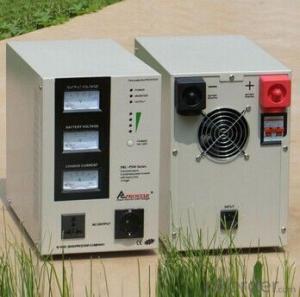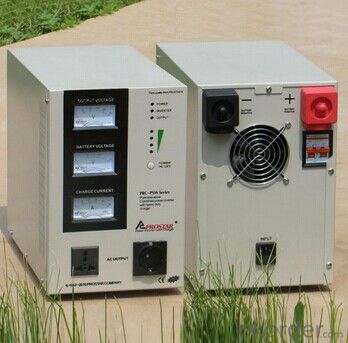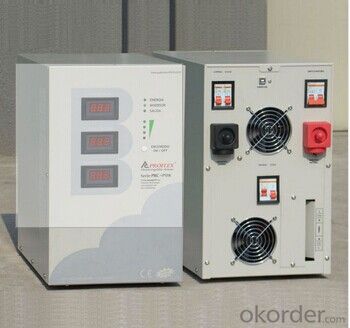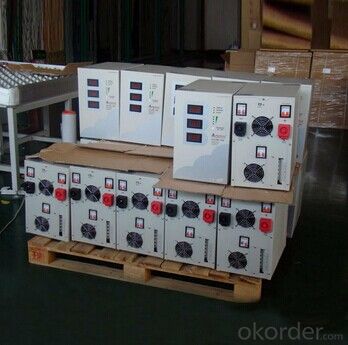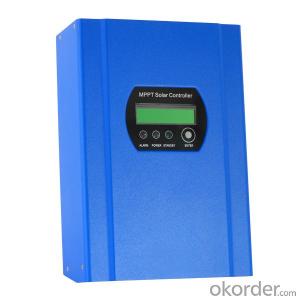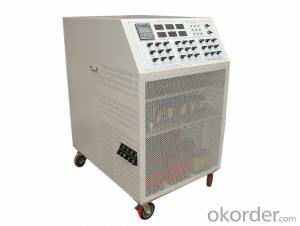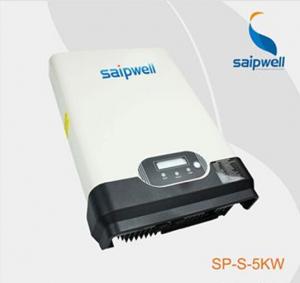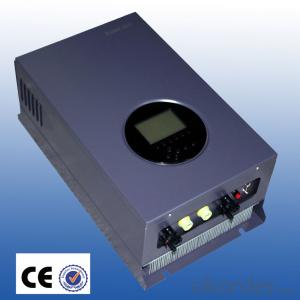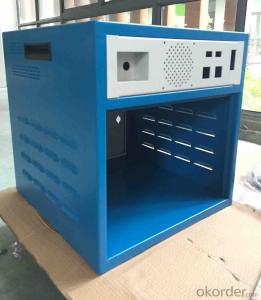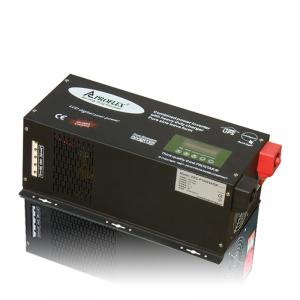Best 12V Solar Inverter Sine Wave Charger with Manual Bypass 5kW
- Loading Port:
- Tianjin
- Payment Terms:
- TT OR LC
- Min Order Qty:
- 10 pc
- Supply Capability:
- 10000 pc/month
OKorder Service Pledge
OKorder Financial Service
You Might Also Like
Specifications
Inverter sine wave charger
with AC input / output breaker
with Battery switch (breaker)
with manual bypass breaker
Automatic
5kW Inverter sine wave charger with manual bypass
Analogue meter display & digital meter display optional
Advantages
> Ultra-fast transfer time
From AC to DC less than 5ms, From DC to AC 0ms
(Routers, Switches PC, Servers and ATM machine will never re-start at Mains failure)
> Faster battery recharge time (Big charge current 30A~50A)
> Automatic tracking mains or generator input (Tracking input voltage, phase & frequency)
> AC / DC conversion waveform (Seamless connection without any spike)
> Battery equalization system (for longer battery life)
> Protection against short-circuit, low voltage, overload, over temperature and over-charge
> Low maintenance cost, Analogue meter & Digital meter Optional
Application range
Computer, Telecom, Deep Freezers, Air Conditioners, Petrol pump machines, Small Scale Industries Malls, Hotels, Restaurants, Banks, ATM Machines, Clinics, All kinds of Kitchen appliances & Home appliances, Weighing bridges,Elevators etc.
Technical specifications
| PRC-PSW SERIES | 500VA | 1000VA | 1500VA | 2000VA | 3000VA | 4000VA | 5000VA | 6250VA |
| BATTERY DC VOLTAGE | 12V | 12V/24V | 24V/48V | |||||
| INPUT AC RANGE | 160~280V / 45~55Hz | 165~260V / 45~55Hz | ||||||
| INVERTER OUTPUT | 220V ± 10% / 50Hz ± 1% | |||||||
| TRANSFER (AC LOSS) | 5ms after AC loss, automatic recovery after utility power back | |||||||
| FULL LOAD CAPACITY | 400W | 800W | 1200W | 1600W | 2400W | 3200W | 4000W | 5000W |
| WAVE DISTORTION | THD < 3% | |||||||
| OVER LOAD CAPACITY | 100% ~ 125% Keep Beeping; > 125% working 30s; >150% 1s shut down | |||||||
| OUTPUT SOCKET | 2outlets | 1outlet + terminal connectors | ||||||
| INDICATOR STATUS | Utility input with "POWER" & "BYPASS" light on | |||||||
| Utility power loss with "INVERTER" light on | ||||||||
| Connected with load "AC OUTPUT" light on | ||||||||
| Warning for battery low & over load with " ! " flashing | ||||||||
| Battery low protection, over load protection, short circuit protection with " ! " light on | ||||||||
| BATTERY CAPACITY | From top to bottom 4 indicator means 100%, 75%, 50%, 25% (" ! "Flashing) | |||||||
| CHARGE STATUS | Indicator flash change from 50% →75% → 100% every 1second means "CONSTANT CURRENT" | |||||||
| Indicator flash change from 50% →75% → 100% every 2second means "CONSTANT VOLTAGE" | ||||||||
| Indicator 50%/75%/100% 3lights on means "FLOAT CHARGE" & battery full | ||||||||
| CHARGE CURRENT | 15A | 20A | 30A/20A | 50A/30A | 70A/50A | |||
| Meter Display (OPTIONAL) | Analogue meter or Digital meter | |||||||
| RECHARGE TIME | 8~10hours | |||||||
| POWER EFFICIENCY | 80% at full load | 75% at full load | ||||||
| NOISE CONDITION | < 45dB | |||||||
| TEMPERATURE | —10°C ~ 40°C (Operation environment); —20°C ~ 50°C (Stock environment) | |||||||
| HUMIDITY | 0~95% no condensation | |||||||
| SIZE OF INVERTER | 420 x 230 x 350 mm | 500 x 280 x 430 mm | ||||||
| MEAS. AFTER PACKING | 45x26x38cm / unit | 53x31x46cm / unit | ||||||
| TYPE OF PACKAGING | Honeycomb carton | |||||||
| WEIGHT OF INVERTER | 11kg | 13kg | 16kg | 27kg | 29kg | 36kg | 38kg | 44kg |
| WEIGHT AFTER PACKAGING | 13kg | 15kg | 18kg | 29kg | 31kg | 38kg | 40kg | |

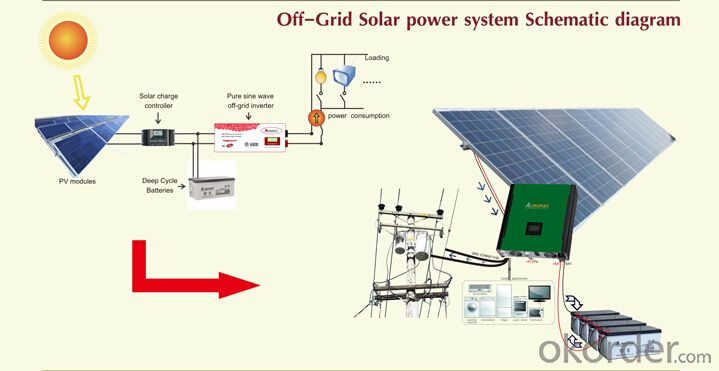
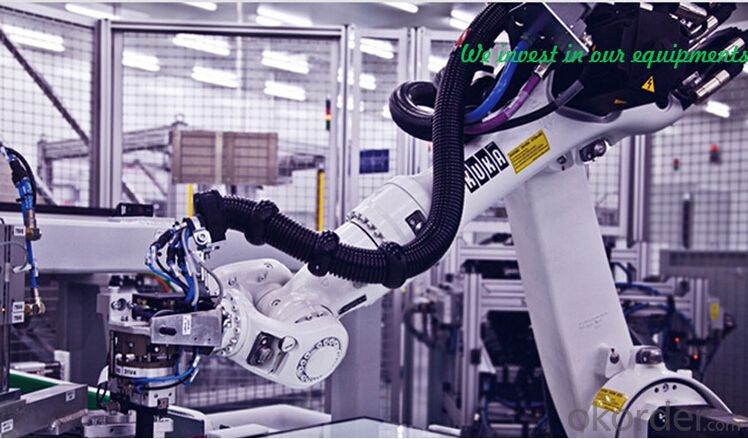
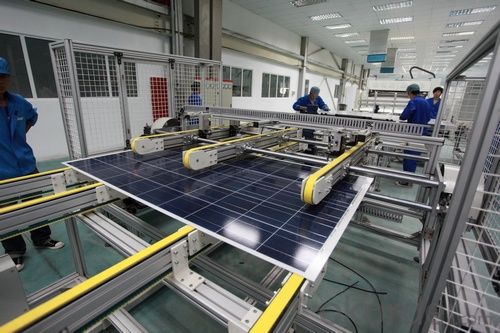
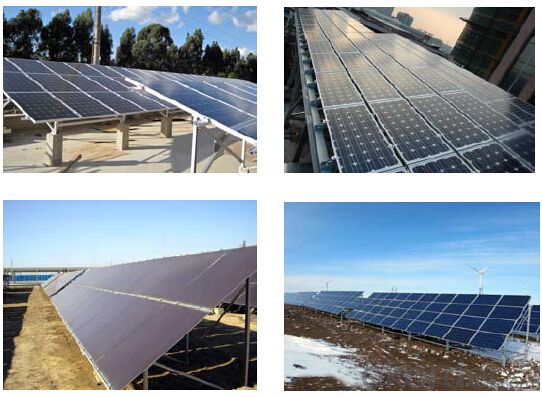
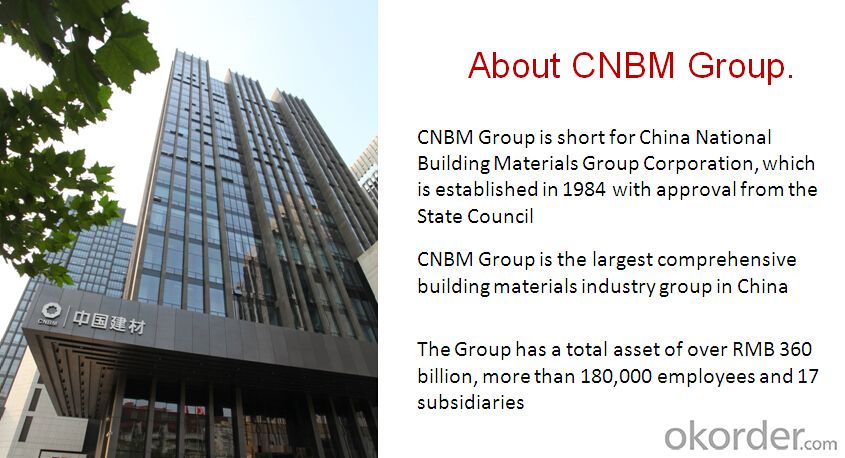

- Q: How do you calculate the efficiency of a solar inverter?
- To calculate the efficiency of a solar inverter, you need to divide the output power by the input power and multiply it by 100. The formula is: Efficiency = (Output Power / Input Power) * 100.
- Q: Can a solar inverter be used with a solar car charging system?
- Yes, a solar inverter can be used with a solar car charging system. The solar inverter is responsible for converting the direct current (DC) produced by the solar panels into alternating current (AC) that can be used to charge the car's batteries. By using a solar inverter, the solar car charging system can efficiently utilize the energy generated by the solar panels to power electric vehicles.
- Q: How does a solar inverter handle varying solar irradiance levels?
- A solar inverter handles varying solar irradiance levels by continuously monitoring the incoming solar energy and adjusting its operations accordingly. It converts the direct current (DC) produced by solar panels into alternating current (AC) that can be used to power electrical devices. When the solar irradiance levels are high, the inverter optimizes the power output to match the maximum potential of the solar panels. Conversely, during low solar irradiance, the inverter adjusts its operations to ensure optimal efficiency and power generation. This adaptive nature of solar inverters allows them to efficiently harness solar energy under varying conditions.
- Q: How does a solar inverter handle grid disturbances (voltage sags, swells, flickers)?
- A solar inverter handles grid disturbances such as voltage sags, swells, and flickers by employing various protective mechanisms. It actively monitors the grid's voltage levels and reacts accordingly to maintain a stable and reliable power output. During voltage sags, the inverter adjusts its output voltage to compensate for the drop and ensure a consistent energy supply. In the case of swells, the inverter quickly detects the excessive voltage and disconnects from the grid to prevent any damage. Flickers, caused by rapid voltage fluctuations, are minimized by the inverter's ability to rapidly respond and stabilize the power output. Overall, solar inverters play a crucial role in mitigating grid disturbances and safeguarding the solar power system's performance and longevity.
- Q: Can a solar inverter be used with different grid voltages or frequencies?
- No, a solar inverter cannot be used with different grid voltages or frequencies. Solar inverters are designed to convert the DC power generated by solar panels into AC power that matches the specific grid voltage and frequency of the electrical grid it is connected to. Using a solar inverter with different grid voltages or frequencies can cause damage to the inverter and may result in a loss of efficiency or functionality.
- Q: What is the maximum efficiency at partial load for a solar inverter?
- The maximum efficiency at partial load for a solar inverter typically depends on the specific model and design. However, in general, modern solar inverters are designed to have high efficiency even at partial loads. This means that they can still convert a significant portion of the available solar energy into usable electricity, even when the solar panels are not operating at their maximum capacity. The maximum efficiency at partial load can vary, but it is usually in the range of 85% to 95% for most high-quality solar inverters.
- Q: Can a solar inverter be used in a mobile or portable solar power system?
- Yes, a solar inverter can be used in a mobile or portable solar power system. The inverter converts the direct current (DC) generated by the solar panels into alternating current (AC), which is required to power most electronic devices. By incorporating a solar inverter, the mobile or portable solar power system can provide AC power for various applications, such as charging electronic devices or running small appliances, making it a versatile and convenient solution for powering devices on the go.
- Q: Are solar inverters weather-resistant?
- Yes, solar inverters are typically weather-resistant. They are designed to withstand various weather conditions such as rain, snow, and extreme temperatures. However, it is important to note that prolonged exposure to harsh weather conditions could potentially affect their performance and lifespan. Regular maintenance and proper installation can help ensure their durability and longevity.
- Q: How does a solar inverter handle shading or partial obstruction of solar panels?
- A solar inverter typically handles shading or partial obstruction of solar panels through the use of Maximum Power Point Tracking (MPPT) technology. This technology allows the inverter to optimize the power output of the panels by constantly adjusting their operating point to the maximum power available. When shading or obstruction occurs, the inverter automatically adjusts the operating voltage and current of the panels to minimize the impact and maximize the overall energy yield.
- Q: Can a solar inverter be installed indoors?
- Yes, a solar inverter can be installed indoors.
Send your message to us
Best 12V Solar Inverter Sine Wave Charger with Manual Bypass 5kW
- Loading Port:
- Tianjin
- Payment Terms:
- TT OR LC
- Min Order Qty:
- 10 pc
- Supply Capability:
- 10000 pc/month
OKorder Service Pledge
OKorder Financial Service
Similar products
Hot products
Hot Searches
Related keywords
